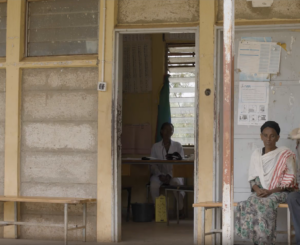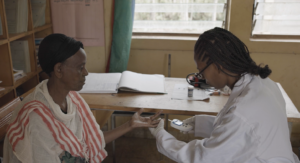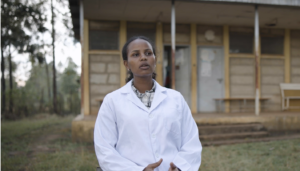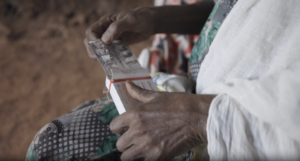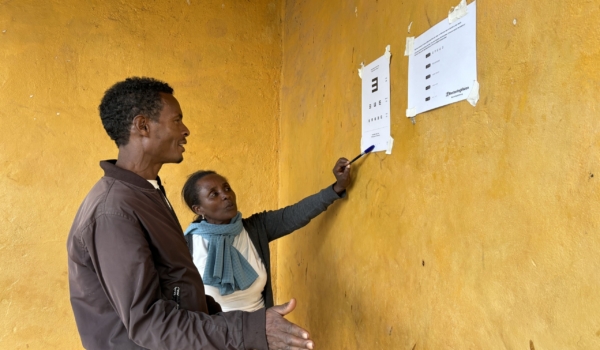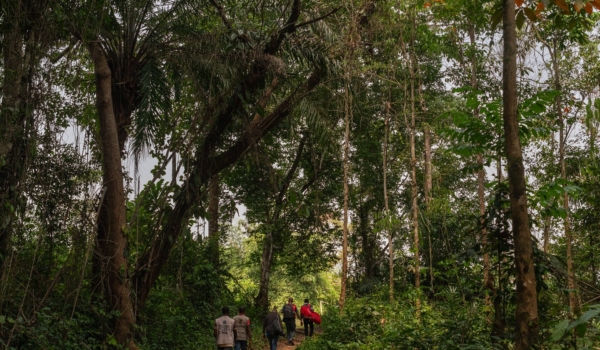Dembobe Sidemu remembers the decision that changed her life. “I was not feeling well for four days,” she recalls. Living in a small rural community in Ethiopia’s Sidama Region, Dembobe would need to make an expensive journey over many miles to reach a hospital or a health center—and for the elderly mother, making the costly and difficult trip was something she could only justify doing if she knew with certainty that she was seriously ill.
Dembobe had a better idea: she would visit the nearby Hida Kality Health Post, where community health workers could help her understand what was wrong.
“She told us what she was feeling,” recalls Abinet Tadesse, the community health worker who cared for Dembobe that morning. “We realized her symptoms resembled a diabetic patient.”
Abinet is one of more than 40,000 women across Ethiopia who serve as community health workers—known nationally as health extension workers—in the country’s flagship Health Extension Program. In January 2023, she was one of 1,500 community health workers to receive a first-of-its-kind training in non-communicable diseases, which the Ministry of Health developed in the blended learning format in partnership from Last Mile Health. At the training, Abinet learned how to screen patients for diseases like breast cancer, high blood pressure, vision problems, and diabetes—and when to refer patients to the health facilities for urgent treatment.
Recognizing Dembobe’s symptoms from her training, Abinet conducted a random blood glucose level test. “It was 419. We were surprised that it was that high,” says Abinet. She knew that any reading higher than 200 mg/dl indicated a suspected case of diabetes—and without immediate referral to a health center, Dembobe was at serious risk. “We told her to go immediately to the health center,” says Abinet.
Dembobe trusted Abinet’s advice and understood that her life depended on receiving the right care. “It was based on the advice she gave me that I went to the health center,” Dembobe explains. “Now I have started taking medication. If not for this health post, I would have faced many problems.”
Today, Dembobe is successfully managing her diabetes with help from Abinet. Without community health workers nearby—equipped to monitor her condition, provide further guidance, and make home visits—managing a chronic condition would be difficult or impossible. “She was here today for a checkup,” says Abinet, sitting outside the health post while children play nearby. “Her glucose level is now stable. If we hadn’t gotten to her on time, something tragic would have happened.”
Abinet says her training in non-communicable diseases has equipped her with the skills and knowledge to treat patients and save lives. “I have the confidence to say this because I got the training. I can perform what is expected of me. I can analyze signs and symptoms and refer patients. I can guide them to start the right treatment,” Abinet shares. “I believe it will be great if other health extension workers, working in other woredas and regions, also get the chance to get the training.”
Building from the successful pilot of the training module, Last Mile Health and the Ministry of Health have begun to scale the training, with the ultimate goal of reaching every community health worker in Ethiopia. With non-communicable diseases representing a growing health burden across Africa—and the leading cause of death in Ethiopia—the need is urgent for community-led intervention. Too often, patients don’t seek treatment for non-communicable diseases until it’s too late, deterred by the distance and expense of reaching a hospital. Equipping the community health workforce with the skills and knowledge to screen for and help manage non-communicable diseases will bridge the healthcare access gap for remote communities like Dembobe’s—and save lives.
Training all 40,000 community health workers in Ethiopia will take time. But the evidence is clear: strong community health systems and effective training for community health workers means better access to lifesaving care for patients at the last mile.
“Community health workers are important, especially for people like me,” says Dembobe, holding her medication in her hands. “We are very happy with the service we are getting at the health post.”

